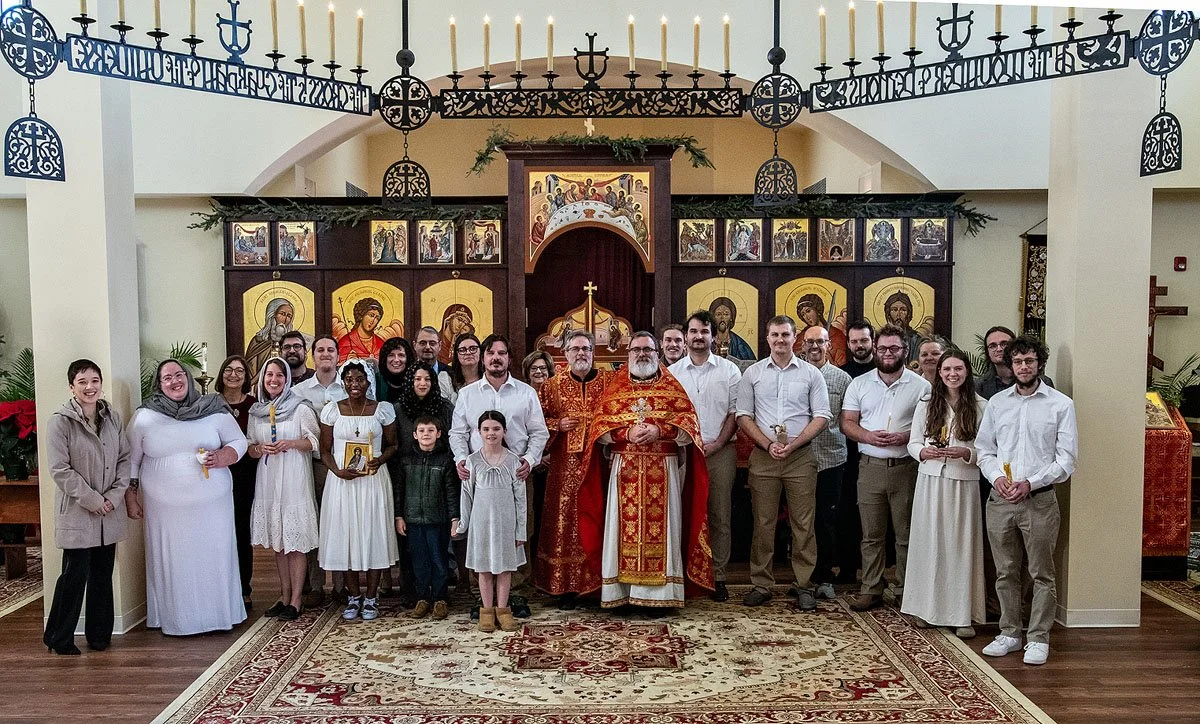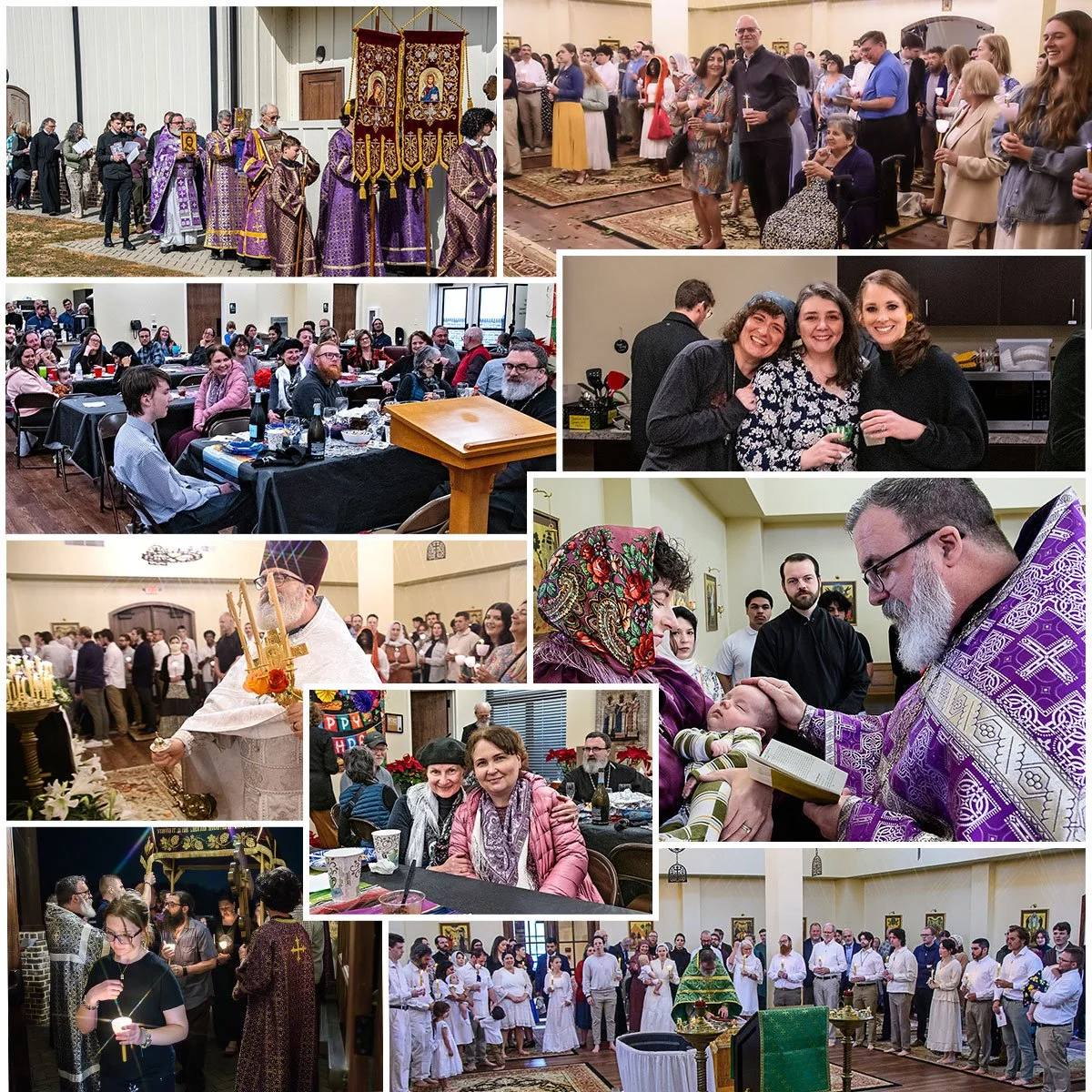Resources

Many informative articles were published in our parish newsletters in the years prior to Covid. Email to the friends and faithful of Holy Cross has replaced our newsletters, but many of the articles are collected here. Use the indexes below to find the topic or author you’re interested in. (Once you click on a topic or author, scroll to the bottom of the page to see the search results.)
Also, have a look at the Recommended Readings on the OCA (Orthodox Church in America) website for a list of books covering a wide range of topics. Essential Orthodox Christian Beliefs: A Manual for Adult Instruction is also available for free download on the OCA’s website.
(Speaking of our parent jurisdiction, the OCA traces its origins to the arrival in Kodiak, Alaska in 1794 of eight Orthodox missionaries from the Valaamo Monastery in the northern Karelia region of Russia. Today, the OCA includes some 700 parishes, missions, communities, monasteries, and institutions throughout the United States, Canada, and Mexico.)
We hope you’ll find these suggested readings to be both edifying and encouraging!
By Author
- Alexander Bogolepov
- Anonymous
- Benjamin D. Williams
- Bishop Gerasim (Eliel)
- Bishop Hilarion Alfeyev
- Bogdan Gabriel Bucur
- Elder Paisios
- Fr Alexander Schmemann
- Fr Alexander Shargunov
- Fr Alexis Trader
- Fr Apostolos Hill
- Fr Artemy Vladimirov
- Fr Basil Biberdorf
- Fr Christopher Foley
- Fr George Morelli
- Fr John Breck
- Fr John Ealy
- Fr John Hays
- Fr John Mefrige
- Fr John Shimchick
- Fr Joseph Allen
- Fr Kyrill Williams
- Fr Lawrence Farley
- Fr Michael Oleksa
- Fr Michael Plekon
- Fr Richard Rene
- Fr Stephen Freeman
- Fr Thomas Hopko
- Fr Thomas Zell
- Hieromonk Calinic (Berger)
- John Boojamra
- Metropolitan Anthony Bloom
- Metropolitan Anthony of Sourozh
- Metropolitan Jonah
- Mtk Deborah Belonick
- Mtk Dennise Kraus
- St Gregory Palamas
- St Innocent of Alaska
- St John Chrysostom
- St John of Kronstadt
- St Luke of Simferopol
- St Maximus the Confessor
By Topic
- Addiction
- Baptism
- Bible
- Biography
- Calendar
- Christmas
- Conciliarity
- Confession
- Cynicism
- Death
- Depression
- Diocese of the South
- Eucharist
- Evangelism
- Fasting
- Forgiveness
- Giving
- Hell
- Holy Fathers
- Holy Friday
- Holy Saturday
- House of God
- Hymnography
- Life as sacrament
- Liturgy
- Love
- Marriage
- Matushka Olga Michael
- Mother Maria Skobtsova
- Nativity
- OCA
- Obedience
- Pascha
- Peacemaking
- Politics
- Practices
- Prayer
- Pregnancy
- Priesthood
- Repentance
- Resurrection
- Saints
- Salvation
- Sickness
- Sin
- Spiritual Reading
- Stability
- Standing
- Stewardship
- Suffering
Orthodoxy and Politics
It all begins with an idea.
TOPICAL INDEX
- Addiction
- Baptism
- Bible
- Biography
- Calendar
- Christmas
- Conciliarity
- Confession
- Cynicism
- Death
- Depression
- Diocese of the South
- Eucharist
- Evangelism
- Fasting
- Forgiveness
- Giving
- Hell
- Holy Fathers
- Holy Friday
- Holy Saturday
- House of God
- Hymnography
- Life as sacrament
- Liturgy
- Love
- Marriage
- Matushka Olga Michael
- Mother Maria Skobtsova
- Nativity
- OCA
- Obedience
- Pascha
- Peacemaking
- Politics
- Practices
- Prayer
- Pregnancy
- Priesthood
- Repentance
- Resurrection
- Saints
- Salvation
- Sickness
- Sin
- Spiritual Reading
- Stability
- Standing
- Stewardship
- Suffering
Rev. Priest Basil Biberdorf
October 2012
Our American political season is reaching a fever pitch in this final month before election day. We can expect to be bombarded with robo-calls and television advertisements, each candidate vilifying the other and attempting to make gold from the base metal of his own career, all in an attempt to sway our votes. We will not be able to open a newspaper without hearing of the daily ebbs, flows, and floods of the campaign.
What perhaps makes this more difficult for us is the desire of many candidates to present their positions as uniquely Christian. America has a long history of organizations arising to defend particular positions as “Christian,” in matters of slavery, alcohol, arms control, tax policy, sexual behavior, and free speech, to name just a few. Consider some of the organizations interested in these causes: the Moral Majority, the Christian Left, Focus on the Family, the Manhattan Declaration, and the Evangelical Climate Initiative.
From an Orthodox perspective, some of these make their cases better than others, articulating points in agreement with Christian belief and our moral tradition. Nonetheless, the reality we face is that the political realm operates according to the rules of a fallen world. It is a world where scarcity prevails and not everyone can have everything, where one wins and another loses, where motives are impure, and where the worst aspects of the fallen human nature—preeminently greed, lust for power, and pride—corrupt the best intentions of many candidates.
The political process itself, in whatever form, is a manifestation of sin in the world. After all, God established the judges to govern ancient Israel, only to see them rejected by his people in favor of kings and princes, with tragic results. “And you will cry out in that day because of your king whom you have chosen for yourselves, and the Lord will not hear you in that day” (1 Samuel 8:18; read the entire chapter). Indeed the kings of Israel are divided into good and bad, with the bad far outnumbering the good.
The Christian encounters this fallen world and must engage it and seek to transform it through the softening of the hearts of men and their return to God. Nonetheless, the Christian must never forget that his own world has little to do with this one. As Christ tells Pilate before his crucifixion: “My kingdom is not of this world” (John 18:36). We confuse Christ’s kingdom (of which we are a part) with the world’s at our peril.
In the first place, there is the risk that we confuse the message of the Gospel: God became man, submitted to death, and overcame death in order for all men to live. What can the political process do about this? Surely we must remain free to speak openly and pointedly about sin and redemption. We should fight the political battle to do so. We must also seek to end gross injustice, and the loss of human lives, each one bearing the image of Christ, through willful violence. Yet the Gospel endures in spite of persecution by the state, just as it endured the Jews, Roman emperors, Islam, and the Communists.
We must also not allow an interest in politics to corrupt our mission. Our aim as Christians is not the transformation of the state into some kind of imagined “Christian realm,” but the salvation of souls by uniting them with Christ and his Church. Many contemporary denominations attract members by promoting their political biases using important code words: “We believe in the Bible,” or “God is still speaking.” Orthodox Christians do not “recruit” on the basis of political affinity, but rather guide men, women, and children to pursue and cling to Christ, receiving the life and love that flows from him alone. We must always present ourselves not as conservative or liberal Christians, but as authentic Christians.
Authentic Christians cannot transfer their obligations to the state. If it is our obligation to care for our neighbor (“When did we see you hungry...?” Matthew 25:31ff), it does no good to transfer our responsibility to politicians and bureaucrats. It is our calling, not someone else’s, especially if “someone else” isn’t a Christian at all.
Authentic Christians also cannot focus on one issue at the expense of another, as often happens with matters of abortion and war, where a given candidate supports one and deplores the other. Unjustified killing is unjustified killing, after all.
Finally, as authentic Christians, we must be careful not to despise our neighbor on the basis of his political beliefs. While some positions are quite clearly wrong (e.g., abortion), Christ says to “love your enemies, bless those who curse you, do good to those who hate you, and pray for those who spitefully use you and persecute you” (Matthew 5:44). Our political discourse often leads us to dehumanizing our opponents, thinking less of them, or considering them stupid. The Gospel ultimately relates to a world restored in Christ rather than one run by politicians. Our Christian calling does not mean we must be politically apathetic, but it limits our expectations, reminding us “put not your trust in princes, in sons of men, in whom there is no salvation” (Psalm 146). For that, we can give thanks.

